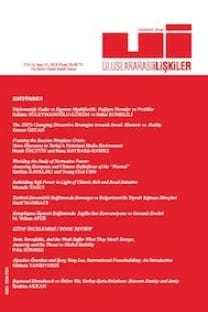Türkiye'de Savaş Düşüncesi
Bu makale, Osmanlı Devleti'nin kuruluşundan Türkiye Cumhuriyeti'nin ilk yıllarına kadar Türkiye'de savaş düşüncesinin gelişimini incelemektedir. Buna göre, Osmanlı Devleti'nin kuruluş yıllarında göçebe toplulukların enerjisini Hıristiyan “öteki”ye karşı yoğunlaştıran bir savaş anlayışı olan “ gaza” ön planda bulunurken, devletin merkezileşmesine ve genişlemesine paralel olarak savaş anlayışının dini boyutları geri planda kalmış ve savaş daha dünyevi bir kavram olarak algılanmıştır. 17. yüzyılın başından itibaren yenilgilerin artması, devletin bekasının savaş yerine diplomasi ile sağlanabileceği düşüncesinin hâkim olduğu bir algının geliştirilmesine neden olmuştur. 20. yüzyılın başlarında bu kez “devletin bekası için savaş” anlayışı geliştirilmiş, bu süreç Birinci Dünya Savaşı ile son bulmuştur. Nihayet Türkiye Cumhuriyeti'nin kurucusu Atatürk daha kısıtlı bir savaş anlayışı geliştirerek ülkenin hayati çıkarları tehdit altına girmedikçe savaşı reddetmiştir.
Anahtar Kelimeler:
Osmanlı İmparatorluğu, Türkiye, Savaş, Gaza, Atatürk
The Idea of War in Turkey
This article examines the evolution of the perception of "war" in Turkey. While in the initial years of the Ottoman state an understanding based on the mobilization of nomadic communities against the Christian "other," namely the "gaza" system, had been the case, this rather religious perception was gradually replaced with a more mundane conception of war. Starting from the 17th century onwards, with the increasing number of defeats, it was thought that the survival of the state could be ensured through diplomacy rather than war. In the beginning of the 20th century, on the other hand, an understanding of resorting to war for the survival of the state was developed, which would last until the Ottoman participation of World War 1. Finally, Mustafa Kemal Ataturk, the founder of modern Turkey. introduced a more limited understanding of war and rejected belligerency unless vital interests of the state were under threat.
Keywords:
Ottoman Empire, Turkey, War, Gaza, Ataturk,
___
- ....
- ISSN: 1304-7310
- Başlangıç: 2004
- Yayıncı: Uluslararası İlişkiler Konseyi Derneği İktisadi İşletmesi
Sayıdaki Diğer Makaleler
Asimetrik Saldırı Savaşları, Siyaset ve Uluslararası Hukuk
Irak Savaşı bir 'Saldırı Suçu' mudur? İngiltere Lordlar Kamarası'nın bir Kararı
Terör ve Devlet Terörizmi Çağında Savaş ve Barış
Muhteşem Ortaklık: Kant ve Clausewitz
